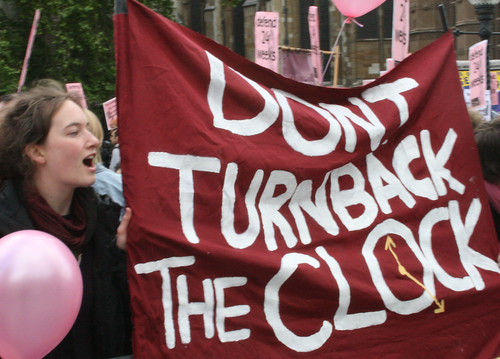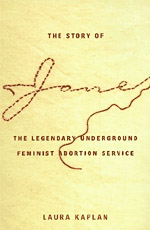
At least
80,000 women die annually as a result of botched abortions. But abortion, when performed under safe and legal conditions, poses fewer health risks than carrying a pregnancy to term and giving birth. So why are women dying needlessly?
The documentary film,
Abortion Democracy: Poland/South Africa, by Sarah Diehl, examines two countries with very different abortion policies and thus, very different realities for women.
In South Africa, abortion is legal, but it is highly unavailable. In Poland, abortion is illegal, but easy (yet expensive) to obtain. These two localized scenarios perfectly demonstrate two facts that are applicable worldwide: 1) Making abortion illegal doesn't stop it from happening; and 2) Just because abortion is legal, it doesn't mean it is accessible. The film takes an extremely interesting and in-depth examination of the forces at play, shaping the policy and the reality for women in both Poland and South Africa.
Abortion was legalized in South Africa after the fall of apartheid in 1994, when the African National Congress was elected to power. Abortion is always legal in the first trimester, and in the second trimester, it is permitted due to mental or physical health problems, rape or incest, or socioeconomic problems (all of which are very vague and ambiguous classifications). South Africa is also one of only two nations (Vietnam being the other) where nurses and midwives are legally permitted to perform abortions. In terms of abortion policies worldwide, South Africa's is one of the most progressive.
But, women who want to obtain an abortion have an extremely difficult time doing so. More and more providers are beginning to refuse to perform abortions based on religious and moral beliefs and many providers are not informed of the new law. Further compounding the problem, training for abortion is usually not provided in obstetrics and gynecology medical school.
As a result, in the Western Cape Province, for instance, there are only three providers. They spend their time driving hours and hours between cities, only to be faced with more women in need than they can possibly help. Women find it difficult to even obtain contraceptives due to the shaming and harassment that accompanies the request.
Abortion providers and their families are being ostracized and shamed within their communities and one nurse recounted stories of the doctors he worked with acting like they were "just waiting for him to fail". Anti-abortion organizations and activity are on the rise, and one of their tactics is to try to label abortion as an import from the West, when truly, as in every society on the planet, abortion has been happening all along - the men just rarely found out about it.
Sarah conducts a particularly powerful series of interviews with a young woman who was raped, became pregnant, and then was kicked out of her house, who was unable to obtain an abortion. Her story drives home the interconnected nature of shame associated with rape, unwed motherhood, and abortion in a society where there are high rates of rape and incest and women often lack the power to negotiate safe sex, even with their partner.
Contrarily, in Poland, abortion was made illegal (except in cases of rape or the woman's health) after the fall of communism in 1993, when the right wing party, in an attempt to form a new national identity, sought the backing of the Catholic church and was elected to power. At the same time, half of all public child care centers closed and comprehensive sex ed ceased to exist. Essentially, it was (and continues to be) a reproductive health nightmare.
Despite the exception for rape and women's health (yet another vague term), women who truly do fall into these categories have an extremely difficult time obtaining a legal abortion. For instance, one woman suffered hemorrhaging in her eye, yet no one would perform the abortion. She is now partially blind. When she brought charges to the
European Court of Human Rights, the first lady of Poland argued that she should have her child taken away for attempting to abort it. The Court ended up
awarding her reparations.
While only 150 legal abortions are performed each year in Poland, it is estimated that
80,000-200,000 illegal abortions are performed each year in the country. These are almost always performed by doctors who do know what they are doing, so there is no record of any women dying from illegal abortion (although this is notoriously difficult to keep track of). But, should you obtain an illegal abortion in Poland don't expect to be treated well, see any follow up care, or to pay anything other than a pretty penny for it. Doctors, in fact, have a vested interest in keeping abortion illegal because it is so lucrative.
Poland became a member of the European Union in 2004 and along with Ireland and Malta (where abortion is also illegal), the EU admitted Poland without asking for a change in the country's abortion policy. While the EU does not have an official stance on abortion, it has to the power to adopt one and to regulate abortion policies of member countries. Pro-choice forces throughout Europe hope to begin exploring the avenues available to address abortion policies at the EU level.
I highly recommend seeing Sarah Diehl's film,
Abortion Democracy: Poland/South Africa. It brings real life, global examples to the political and ideological issues we often address when talking about abortion in our local, state and national context.
Filmmaker, Sarah Diehl is from Berlin, but will be touring the U.S. with her
film in fall 2010 and is available to screen the film and host a discussion at your campus! For more information about setting up a screening on your campus this fall, contact FMF Campus Organizer, Allie McDonald at
amcdonald@feminist.org or 310-556-2500.
 We need you to take action NOW -- TODAY.
We need you to take action NOW -- TODAY. 




